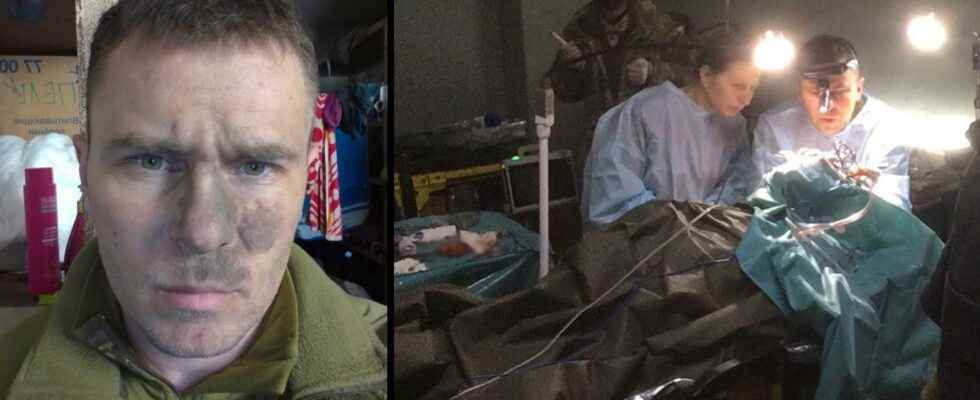Published: Less than 30 min ago
Dmitro Kubrjak operated on soldiers in Azovstal bunkers during the Russian siege.
– It felt like having a role in a disaster movie. Every day could have ended with our death, he tells Aftonbladet.
Surgeon Dmitro Kubrjak, 34, arrived at the port of Mairupol at dawn on March 31.
He was one of two volunteer surgeons that two helicopters flew in a hundred kilometers over Russian-occupied territory. The pilots constantly changed direction, flew low over the ground and followed the terrain to avoid detection by radar or Russian anti-aircraft.
Once there, they had ten minutes to unload themselves and all the ammunition, and load the wounded into the helicopters that were going back to the Dnipro military hospital.
Later, Dmitro found out that one of the helicopters was shot down on the way back. All on board died.
– It is difficult to describe the feelings when I heard that. Joy that we survived, sadness that the men sent back died. But such is war. It is not possible to predict what will happen even in the next few minutes, says Dmitro to Aftonbladet.
“An Apocalypse”
After a few hours, they were taken on by boat across the Mariupol Bay to the besieged Azovstal steelworks. As many Russian ships were moving across the water, the Ukrainian soldiers had to shut down the boat engines several times along the way, to avoid detection.
Just as Dmitro’s group reached the beach next to the Ilyich factory in the Azovstal area, Russian aerial bombardment of the steelworks began and they were forced to seek shelter there. Protection that did not exist.
– We lay under the open sky for three, four hours. Meanwhile, we counted 20 approaches by Russian aircraft. It was like a Hollywood movie about Armageddon, simply an apocalypse. Everything was smoking and burning at the factory, says Dmitro in an interview with the BBC Russian Service news podcast.
When the airstrikes died down, he and his colleagues were brought into the steelworks area by Azov soldiers. First, Dmitro was briefly in the bunkers under Azovstal, taking care of the wounded. Then he and some colleagues were taken further in an ambulance to the Ilitj factory. Halfway, the driver had wheel problems.
– During the 15 minutes it took to change the tire, four grenades exploded very close by, Dmitro tells the BBC.
Treated 300 wounded soldiers
In the bunker under the Ilitj factory, Dmitro and his colleagues cared for 300 seriously wounded soldiers. Despite dire conditions, where the electricity from the diesel generators often went out, they managed to save many.
– A patient who came in with severe head injuries was about to die. But we trepanned the skull and he survived. It turned out that he had a wife and children. It felt amazing that in such a difficult situation we managed to save him, Dmitro told the BBC.
After several unsuccessful attempts to break out of the siege, in which many Ukrainian soldiers died, Dmitro and his colleagues were captured by Russian soldiers on April 12.
They were taken to the Olenivka prison camp, where Dmitro remained until September 21.
– We lay directly on the concrete floor for several nights. Then we got mattresses. But every day in Olenivka felt like the last, Dmitro told the BBC.
On July 29, an explosion occurred in the prison camp, in which 53 Ukrainian Azov soldiers died. Dmitro is convinced that Russia carried out the blast, not Ukraine as the Russian side claims.
– 200 Ukrainian prisoners were taken to a part of the camp that had not been used before. The next day the explosion happened, Dmitro told the BBC.
“Can’t compare”
During the truck ride on the way to the prisoner exchange on September 21, all Ukrainians were tied behind and blindfolded.
– The Russians said that every movement was counted as an escape attempt and would lead to us being shot dead, Dmitro tells the BBC.
When he was finally back in Ukraine, it felt overwhelming:
– The feeling of freedom when I stepped down on Ukrainian soil cannot be compared to anything else, he tells the BBC.
When Aftonbladet gets hold of Dmitro, he says that he lost 20 kilos during his imprisonment, but that he has now started to gain weight again. He is on leave from his job as a military doctor, but expects to be back at the hospital in Dnipro soon:
– Obvious. I want to be useful to the Ukrainian army and the Ukrainian people.
Footnote: The Azov Battalion is designated by Russia as a neo-Nazi unit, and has recently been labeled a terrorist. Other observers believe that when the battalion was formed in 2014, it had many far-right members, but that today it is more like an apolitical elite force within the Ukrainian army.
